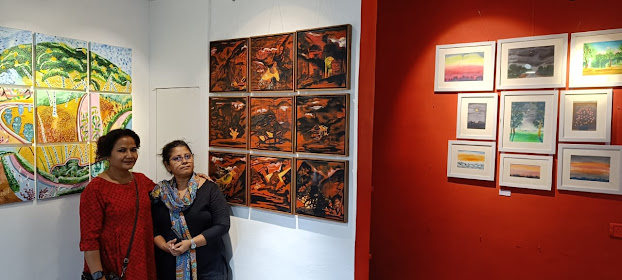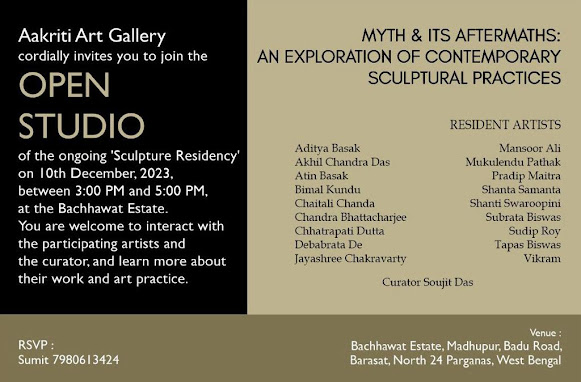Humans first set foot on the moon in 1969, conveying the sensation of human reality to space and from space, the nature of our own reality was seen and many concepts emerged. Creation, need and reality are considered the pillars of every era and fulfilling these pillars requires constant effort and skill. Meeting these three pillars is the need of the artist and individual in the field of literature. In every age, every practitioner of art follows these three pillars honestly. Suraj Dilip Kamble is one such emerging contemporary artist who consciously practices slow art and fulfils these three pillars.
 |
| Artist: Suraj Kamble |
Suraj's paintings revolve around the facts and brutal realities of the world. These facts and realities are deeply buried in the heaps of socialism, the successes and privileges of the contemporary world, and in the elite. Digging deep inside these rubbles, we find the remains painted by Suraj. This deep layer is like the remains buried in our society for years. It is the neglected section of society, which helps to sustain our society but is ignored and classified under socio-economic inequality or caste, creed and widespread prejudice. He has endowed the wages earned by working all day through both physical work and painting. The hard work of working was not even, to the wages he received at the end of the day. He understood that life is in the same way as the fruits that come with hard work. With that sensitivity and effect, this has become the emotional world of Suraj's picture. The effectiveness of this sensory awareness has become the ethos of Suraj’s painting.
.jpg) |
| Smita Kinakle and Suraj Kamble with Saffronart CEO Dinesh Vazirani |
Suraj's series of works, ‘Black Hole’, is on the one hand a mirror depicting the brutal lives of sanitation workers in the city, with all the facilities available against the least convenient equipment and through which they are completing their tasks. The same paradox of the song is presented to the world in its own style. Suraj's picture is a presented symbolization of human forms with their lean, hard-working bodies.
The entire structure of the paintings appears as monotypic. It's a series highlighting these voiceless people, their canvases are the stories of these people, and every stroke of brush is the face of their pain, struggle and humiliation. These are some of the cruel truths of human life that can be seen with the naked eye, which are experienced and felt once in a lifetime. This is not the idea of any poet or writer. It's not just for the beautification process, it's a pure reality. Art, in its myriad forms, has the power to cross borders, connect different hearts, and reveal a path to a more compassionate and just world. As an artist, Suraj uses the practical form of the landscape in his creation, as a catalyst for social introspection and change, and through this current narrative of change, one will have a powerful experience that is visible to the human eye in the real world.
- Smita Kinkale
Artist / Teacher / Writer
.jpeg) |
| T: The Sleep M: Acrylic on canvas, S: 42x42 in |
अभिकाल्पणिक वास्तव
मानवाने
1969 मध्ये चंद्रावर पहिले पाऊल ठेऊन अंतराळाला मानवीय वास्तवाची संवेदना पोहोचवली
अंतराळातून आपल्याच वास्तवाचं स्वरूप न्याहाळलं आणि अनेक गर्भित संकल्पनांचा उदय झाला
.
भौतिकजीवनाच्या
कक्षा विस्तीर्ण होण्याचा वेग वाढला या वेगवान बदलत चाललेल्या समाजाच्या मानसिक आणि भावनिक गरजा
पूर्ण करण्यासाठी चित्र , नाट्य ,साहित्याच्या निर्मितीलाहि वेग आला .
निर्मिती, गरज आणि वास्तव हे प्रत्येक युगाचे आधारस्तंभ मानले जातात आणि हे स्तंभ पूर्ण करण्यासाठी सतत प्रयत्न आणि कौशल्य आवश्यक असते . या तीन स्तंभांची पूर्तता करणे ही सर्वच क्षेत्रातील कलाकार आणि व्यक्तीची जबाबदारी आहे. प्रत्येक युगातील कला साधना करणारा प्रत्येक व्यक्ती या तीन स्तंभांचे प्रामाणिकपणे पालन करतो.
सूरज
दिलीप कांबळे हा असाच एक उदयोन्मुख समकालीन
चित्रकार आहे जो जाणीवपूर्वक हळुवार रेषां
रंगलेपणातून चित्रनिर्मितीचा सराव करतो आणि हे तीन स्तंभ पूर्ण करतो.
सुरजची चित्रे जगातील तथ्ये आणि क्रूर वास्तवांभोवती विहरत आहे. समाजिकतेच्या ढिगार्यांमध्ये, समकालीन जगाचे यश आणि विशेषाधिकार आणि प्रतिष्ठित वर्गात खोलवर दडलेली वस्तुस्थिती आणि वास्तव आहेत. या ढिगाऱ्यांच्या आत खोलवर खोदल्यावर आपल्याला सूरजने चित्रित केलेले अवशेष सापडतात. हा खोल थर आपल्या समाजात वर्षानुवर्षे गाडलेल्या अवशेषांसारखा आहे, हा समाजाचा उपेक्षित वर्ग आहे, जो आपल्या समाजाला टिकवून ठेवण्यास मदत करतो परंतु सामाजिक-आर्थिक विषमता किंवा जाती, पंथ, व्यापक, पूर्वग्रहांखाली दुर्लक्षित आणि वर्गीकृत केले जाते.दिवसभर राबणाऱ्या मजुरांच्या जीवनाबद्दलची निरीक्षण आणि परिणाम याचा अभ्यास केला . दिवसभर राबवून मिळणाऱ्या मजुरीचा आनंद त्याने प्रत्यक्ष कृती आणि चित्रकृती दोन्हीतून घेतला आहे . राबताना होणाऱ्या कष्टांचा मागमूसही दिवसाच्या शेवटी मिळालेल्या मजुरीनंतर नसायचा. जगणं हे असंच कष्टानंतर मिळणाऱ्या फळात आहे हे समजून घेतलं. हि संवेदनिय जाणीवेची परिणामकारकता सुरजच्या चित्राचे भावविश्व ठरले आहे.
.jpeg) |
| T: Esteem and Thought process M:Acrylic and charcoal on canvas S: 48x108 inch Year: 2022 |
सूरजच्या चित्रांची मालिका "ब्लॅक होल" व अन्य
ही एकीकडे शहरांतील सफाई कामगारांच्या दाहकश्रमिक जीवनाचे चित्रण करणारा आरसा आहे, ज्यात अल्प उपकरण उपलब्ध आहेत मुंबईतील सफाई कामगारांच्या क्रूर जीवनाचे
चित्रण करणारा आरसा आहे, ज्यात कमीत कमी सोयीस्कर उपकरणांच्या विरूद्ध सर्व सुविधा
उपलब्ध आहेत आणि त्याद्वारे ते त्यांची कामे पूर्ण करत आहेत. जगण्यातला हाच विरोधाभास
जगासमोर स्वतःच्या शैलीतून मांडला आहे. सुरजची चित्र ही रूपकात्मक पातळीवर मानवी रूपांचे
त्यांच्यादुबळ्या, कष्टमय शरीरासह
प्रस्तुतिकरण
करत आहेत. चित्रांची संपूर्ण रचना एकरुपक म्हणून प्रकट होतात. मानवी असुरक्षितता आणि
सामर्थ्य याबद्दल तीव्रतेने मांडतात.या आवाजहीन लोकांवर प्रकाश टाकणारी ही एक मालिका
आहे, त्याचे कॅनव्हास या लोकांच्या कथा आहेत आणि ब्रशचे प्रत्येक स्ट्रोक म्हणजे त्यांच्या
वेदना, संघर्ष आणि अपमानाचा चेहरा आणि काहीसे निस्तेज पण ऊर्जेच्या प्रतीक्षेतील रंगसंवाद
आहेत असे भासते .
मानवी जीवनातील काही क्रूर सत्ये आहेत जी आयुष्यात अनुभवली जातात, भावली जातात. तसेच ती कवीची किंवा लेखकाची कल्पना नाही. केवळ सुशोभीकरण प्रक्रियेसाठी तर नाहीच ते एक शुद्ध वास्तव आहे.
सुरजची
चित्रे हि परिणामांना असंख्य स्वरूपात सीमा
ओलांडण्याची,भिन्न हृदयांना जोडण्याची आणि अधिक दयाळू तसेच न्याय्य जगाकडे जाण्याचा
मार्ग प्रकाशित करण्याची शक्ती बाळगतात . एक कलाकार म्हणून, सुरज सामाजिक आत्मनिरीक्षण
आणि परिवर्तनासाठी उत्प्रेरक म्हणून त्याच्या निर्मितीत भूलोकीचं व्यवहारात दिसणारे
रूप याचा वापर करून बदलाच्या या चालू कथनाद्वारे वास्तव सृष्टीतले मानवी चक्षूंना दिसणारा
असा समर्थ अनुभव आपणास नक्कीच देतो .
स्मिता
किंकळे.
अध्यापिका क्युरेटर चित्रकार
 |
| Jehangir Art Gallery-2024 |

.jpeg)
.jpeg)




.jpg)
.jpg)


.jpg)


